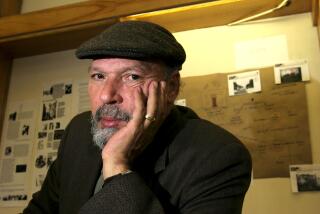Three Questions for Hershel Parker
- Share via
Question: What was your introduction to Melville?
Answer: Through Shakespeare. I left high school after the 11th grade and for seven years was a railroad telegrapher in Louisiana and Texas. I caught tuberculosis and took only one book to a sanitarium, a one-volume Shakespeare. By the time I read “Moby-Dick” and “Pierre,” I was astounded that an American writer had absorbed Shakespeare so profoundly.
In 1962 at Northwestern University, I wrote a paper for the Melville scholar Harrison Hayford on “The Metaphysics of Indian-Hating” in “The Confidence-Man.” I am a quarter Indian (Cherokee and Choctaw), but this was not an exercise in victimology. With my Baptist background and knowing the analysis of the practicability of Christianity in “Pierre,” I saw that in his allegorical depiction of Indian-hating, Melville was contrasting absolute and nominal Christianity. Hayford demanded publishable articles, so I sent that paper to a literary journal published at UCLA and in 1963 found myself with a new career, that easy.
Q: What was the most exciting discovery for you in this volume?
A: Finding that Melville had completed a book called “The Isle of the Cross” around May 22, 1853. I had the privilege of telephoning two old masters, Hayford and Merton M. Sealts, to tell them Melville had finished the story about the abandoned wife he had tried to persuade Hawthorne to write. Then it was even more exciting to try to imagine what Melville had learned while writing “The Isle of the Cross,” next after “Pierre,” and had then brought to his writing of “Bartleby.”
Truth is, I wrote the two volumes in shifting states of high excitement. I loved using unlikely evidence, as for 1862, when the author of the forgotten “Moby-Dick” humbly consulted many authorities to see what they said about achieving greatness in literature. From his marginalia, I was able to make a dramatic narrative about his quest for an aesthetic credo.
Q: Could Melville have written in our times?
A: Not as he did. Melville plundered travel books, encyclopedias, all kinds of books, as any good writer could do now. But he was an autodidact who read all of Spenser, Shakespeare, Milton, Wordsworth, Byron and other poets on his own, at his own pace, absorbing literature into his lifeblood in a way that would be very hard to equal today. He was steeped in masterpieces. That’s rare in our age of sound bites and pervasive electronic racket. Do you know anyone who has read all of “The Faerie Queene” this year?
The bright side is that any enterprising young person with literary ambitions now has instant access to splendid performances of many of Shakespeare’s plays. Melville heard Fanny Kemble read from “Macbeth” one night, and then from “Othello” another night. Just think how rhapsodic he would have been at seeing and hearing Baz Luhrmann’s “William Shakespeare’s Romeo and Juliet” as often as he wanted to. When will the great Shakespearean Patrick Stewart record all of “Paradise Lost” for commuting Angelenos? When will Laurie Anderson perform all of Wordsworth’s “The Excursion”?
More to Read
Sign up for our Book Club newsletter
Get the latest news, events and more from the Los Angeles Times Book Club, and help us get L.A. reading and talking.
You may occasionally receive promotional content from the Los Angeles Times.





